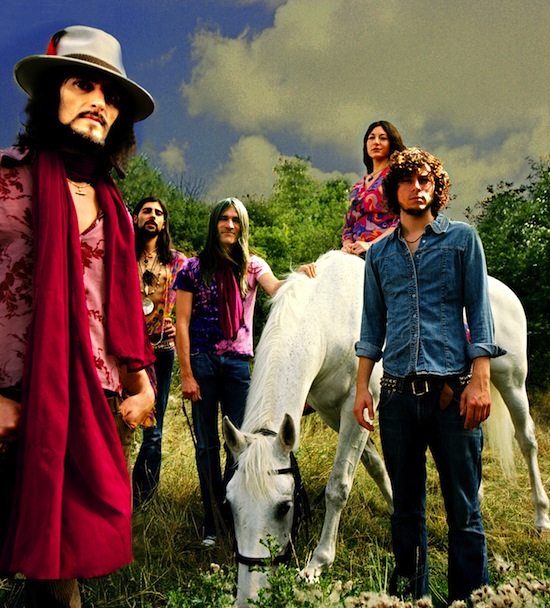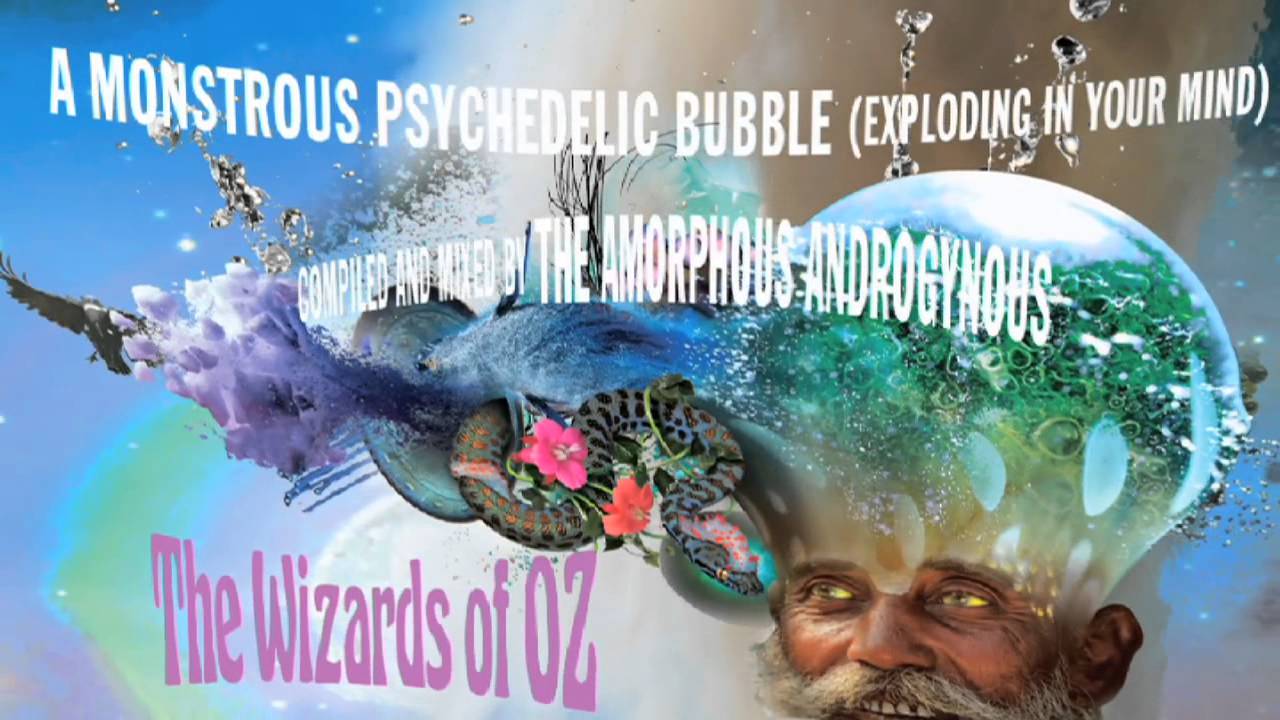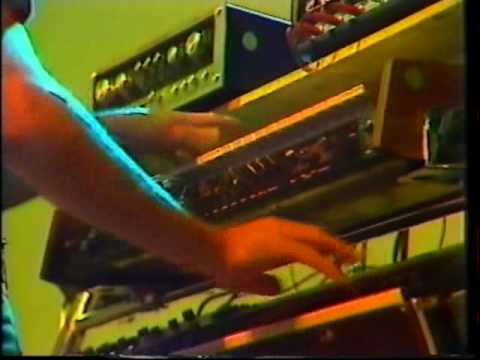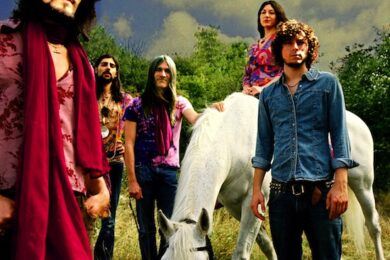Seasoned psychonauts Garry Cobain and Brian Dougans have spent most of their lives producing the kind of music that only makes sense when you’re out of your mind. First as 1990s cybernetic evangelists Future Sound of London and latterly, having mellowed somewhat, as soothsaying minstrels the Amorphous Androgynous. At the moment, the Amorphous Androgynous are best known for an album they didn’t make: a few years ago they worked on a record with Noel Gallagher, who found the process tedious and aborted the project. Nevertheless, two songs from those sessions have ended up in some form on his new album.
In keeping with their spiritual disposition, it’s as Amorphous Androgynous that Cobain and Dougans have been sharing their more out-there discoveries and joining the psychedelic dots in their acclaimed compilation series and occasional studio transmissions, A Monstrous Psychedelic Bubble. The first one, in 2008, addressed ‘Cosmic Space Music’, while its successor, a year later, sent out ‘Pagan Love Vibrations’ and featured cuts from Faust, Bo Diddley, Pentangle and Turzi, among numerous others. These, and the six mixes that followed, were noble attempts at pinning down a groovy kind of Western psychedelia through the ages, but, in the age of the playlist, when anyone can cobble together a far-out selection, it’s conceivable that listeners do not appreciate the time and effort Cobain and Dougans put into these sessions.
Their latest instalment, however, ‘The Wizards of Oz’, is a more geographically focused affair that takes the listener on a wild ride over 2CDs across the unchecked terrain of the Australasian new age and progressive rock scenes, stretching from late-60s Hendrix rip-offs and Syd Barrett-gone-walkabout types to contemporary gear by Tame Impala and Pond. It’s quite a trip, largely because most of the tracks will be unfamiliar to European ears and are very good indeed. We tuned in with Garry Cobain to get the low-down on the in sound from deep Down Under.
How did you first get turned on to Australian and Kiwi psychedelic rock?
Garry Cobain: Well, the Amorphous Androgynous played some dates in Australia in 2005 and again round 2009, and people there hearing what we were doing were proud to play us some Australian bands like Wolfmother and Tame Impala, thinking we’d dig it. We did, and we had them in mind for a new Monstrous Psychedelic Bubble. When we hooked up with Warners Australia head honcho Tony Harlow, who is a huge Monstrous Bubble fan, he sent us tracks which quickly opened our eyes and ears. We began to be pretty intrigued because we genuinely didn’t know much of the musical output of that continent despite being such fervent record collectors. So we began to search ourselves and the idea kinda progressed from there. It took a year before we decided to dedicate a volume of the Bubble exclusively to Antipodean cosmic space music.
Are there any defining characteristics that set Aussie psych apart from its western counterpart?
GC: Some of it certainly, yeah. Rob Thomsett sonically told the Aboriginal dreamtime myth of Yaraandoo and the outback in his space-jazz instrumental Yaraandoo album, initially released as only 100 vinyl in 1975, so that has a pretty unique sound. Yet I’d generally say there is much shared consciousness in the timeless nature of psychedelia or cosmic space music which is why it set aflame globally in the first place and which is precisely why we started these mixes, as much to share THAT consciousness but also to show how it’s still very much alive and happening now, developing its own form of possibility.
There is no doubt that a lot of the output is inspired by its western counterpart revolution too. God knows how long the influence took to be felt Down Under in a pre-internet age, though I guess it would be heard through radio and imported records but by the time the labels released and exported their response, it probably lagged by a good year or two and you can certainly trace that in the ripple of the styles and when they occurred.
Of course, England and the states very much thought of themselves as the sole epicentre, so naturally anything not directly interacting didn’t make it aboard the magic bus, where only the pioneers got onboard and were written into musical history. It’s probably why quite a few Australasian bands decamped to London wanting to be at the epicentre, with very few success stories, however. We don’t care about who was first, though, on the Bubble: retrospection creates a level playing field. We’re just interested in what works NOW this minute!
Do you Australia and New Zealand being pretty remote, or far from the US and Europe, helped them develop their own style of psychedelia?
GC: I’d have to say yes of course, but my impression is it was nonetheless inspired by and adapted from the western revolution, a shared cosmic consciousness exploring universal truths. I can equate most of the music on this album to a western counterpart which had preceded it but that doesn’t matter – it’s simply great music at the end of the day and forges its own place.
Nonetheless there is some material that is entirely unique. Geoff Krozier and his magic invocations for example performed against the backdrop of the Rainbow Generator’s cosmic improvisations which was in a way a lineage from Arthur Brown’s ‘Fire’, but Geoff was explicitly devoted to magick and alchemical arts. It was his life. He’s certainly extremely fascinating and forged far more recognition in the states during several years there than in Australia itself.
While investigating this genre, what has surprised you most of all?
GC: That because the Australasian music business was almost entirely independent from the west, very little pre-1990s music has been afforded its place in the pantheon of cosmic space music, both critically and in its physical distribution. This certainly was a revelation. We actually became quite righteous about it after about a year of research. It fuelled us.
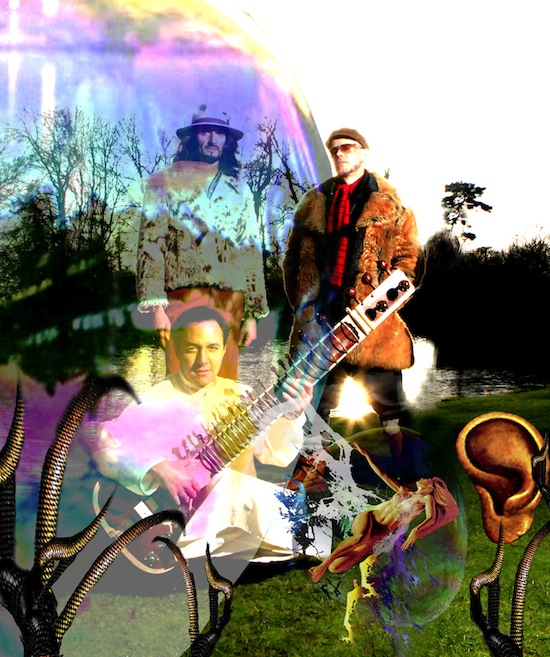
Where – and with which record or act – would you recommend budding Aussie psych fans start their quest?
GC: Well, our thing is always about celebrating the full spectrum of exoticism. Very few bands singularly cover it, and having spent two years showing the panoply and diversity, why would I single it down to one artist? I would say meditate, float in an isolation chamber, roll up a fat one, do whatever you do to transcend and stick on A Monstrous Bubble and gradually narrow your gaze and pick out things that resonate and go from there into your own journey. I have to say that otherwise what’s the point of painstakingly choosing so much exotic diversity, eh?
Who is the leading light of Aussie and Kiwi psych? Is there one person, or group, who dominated the scene?
GC: It’s funny, we pride ourselves specifically on not being experts. This gives us the ability to simply choose what works now irrespective of what history dictates, which is why MPB will always have a timeless quality. It was only when I sat down to write the liner notes that I researched what and who we’d found that I learnt anything about the artists. I immersed for two weeks in all the artists and became quite emotional about all the lives and histories of the people involved. In the end I wrote way too much and wrapped myself in string trying to work out why we had never heard some of this music – it got too deep and there were no definitive answers. So we dropped the liner notes for something more enigmatic.
Leading lights? The paradox in that is that these days music is without boundaries, being a global digital unity, so bands like Tame Impala have reached a global market in a way that none of these bands from the 60s and 70s could ever imagine. In fact, to illustrate that point, in the two to three years we worked on this album, Tame Impala exploded globally.
Which are your favourite tracks on your compilation?
GC: Our favourite ones are on the vinyl ‘cos there we singled out the more sonically diverse ones: Sunset Strip, Kanguru, Cybotron to Geoff Krozier and the Rainbow Generator, Leong Lau, Hiroshi and Claudia to Tame Impala.
I really enjoyed discovering Pip Proud, SJC Powell and Kanguru. What do you know of these acts?
Yeah, Pip Proud was a huge find and I feel quite emotional about him actually. Some of the voice cut-ups interspersing the mix are actually him from a very rare radio series he did in the 70s which we managed to unearth. His two albums were little-known but there was a resurgence of interest in the late 90s by which time he was performing blind, I do believe. He died shortly after. I love his slacker cool, it’s hard to be that loose. I know – I’ve tried.
SJC I know nothing about but I love that track. I have an affinity for Christian psychedelia or anyone exploring spirituality in their music.
Kanguru is the perfect name for an Aussie new age outfit, right?
GC: Haha, yes indeed. We love band names, it’s all part of the magic and this one is right up there. I think I would have included them on name alone it’s that good, but luckily their music is amazing and literally – but interestingly – the only example of devotional eastern-led mysticism we could find. Which is strange since globally everyone was touched by an aspect of it, especially once the Beatles had dabbled with meditation with the Maharish and recorded ‘Within You Without You’, one of the first stereo recordings in the west of eastern classical instruments.
Did you spend a lot of time and money on Discogs researching this music, or do you have dealers and contacts in Australia and beyond who assisted you?
GC: There was a lot of internet time but also David Laing who works for Warners in Australia is a huge resource and he literally sent us hundreds of tracks from which we selected an initial batch. It was from this batch that our own search springboarded… and yes, naturally being vinyl freaks we tracked down our favourites at great expense.
Are there any Aboriginal psych acts, or bands that featured Aboriginal musicians or influence?
GC: There probably are beyond what we found actually. Rob Thomsett’s Yaraandoo channels the spirit of the Aboriginals and the desert and we include three tracks in the collection. At one stage we were gonna fly a bit of Rolf Harris’s Aboriginal didgeridoo track in the mix but we couldn’t make it work and didn’t really like the track so we dropped the idea, plus it seemed like we were intellectually feeling an obligation to cover that aspect and we normally resist when the intellectual tries to overpower the heart.
Did any of these older acts ever make it to the UK to play?
GC: Good question and one I’d like to know myself. Did Cybotron ever play abroad? You’re probably more likely to see Cybotron play here now than then. I expect travel costs might have been prohibitive in those days.
We were working on the Noel Gallagher album around 2011 at a studio in Twickenham and looking at all the gold discs on the wall. The studio is owned by a guy who had cowritten some huge hits with people like Tina Turner and Michael Jackson. It was only later when researching the tracks on the Wizards of Oz and looking into a track we had included – but which was later dropped – Terry Britten’s ‘Bargain Day’, that we realised we had in fact been at the studio of Terry Britten. He’d started his musical career as a songwriter in Australia… small cosmic worlds.
Have there been other comps of Aussie psych?
GC: Yes, a fair few actually, mostly covering the 1967-69 garage psych sound, which is very different from our philosophy and ethos of it being a timeless thread that is eternal and showing how that lineage morphs into a present and unique form of cosmic space music through the decades. We’re not interested in being historians just in carrying that seed of psychedelia forward to the present.
In terms of record hunting and research, the internet has levelled the playing field. What are your areas of particular interest these days – or is this a secret? Are there any countries whose scenes are still to be tapped?
GC: Yes, probably quite a few. France is great, plus the eastern European countries were very fertile and are due an appraisal. But in a way dedicating MPB to a territory was never our intention since we espouse it as a global phenomenon without boundaries. We wanna help dissolve the boundaries, man!
A Monstrous Psychedelic Bubble (Exploding in Your Mind): The Wizards of Oz is out now on Monstrous Bubble/Festival

